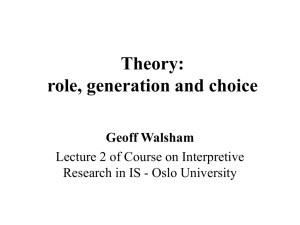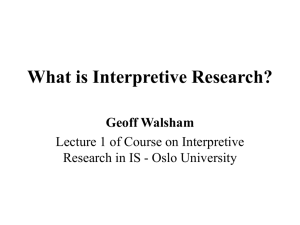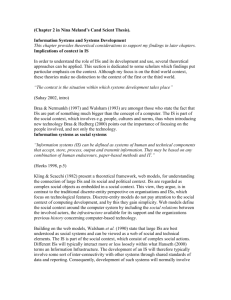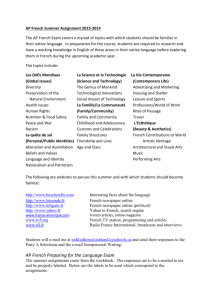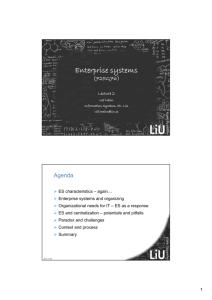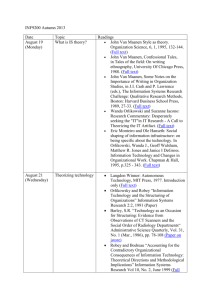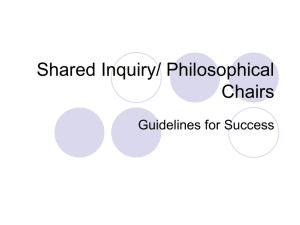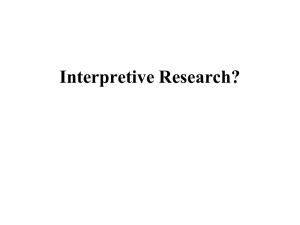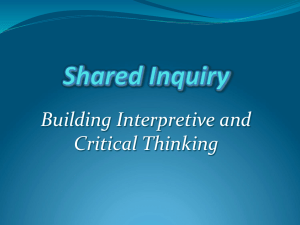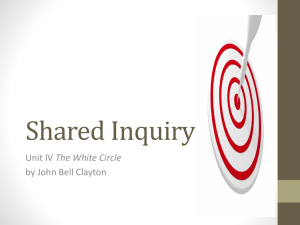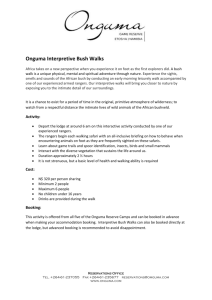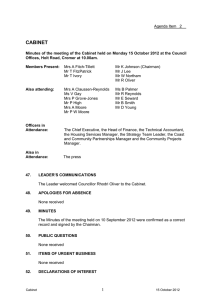Action Research Workshop
advertisement
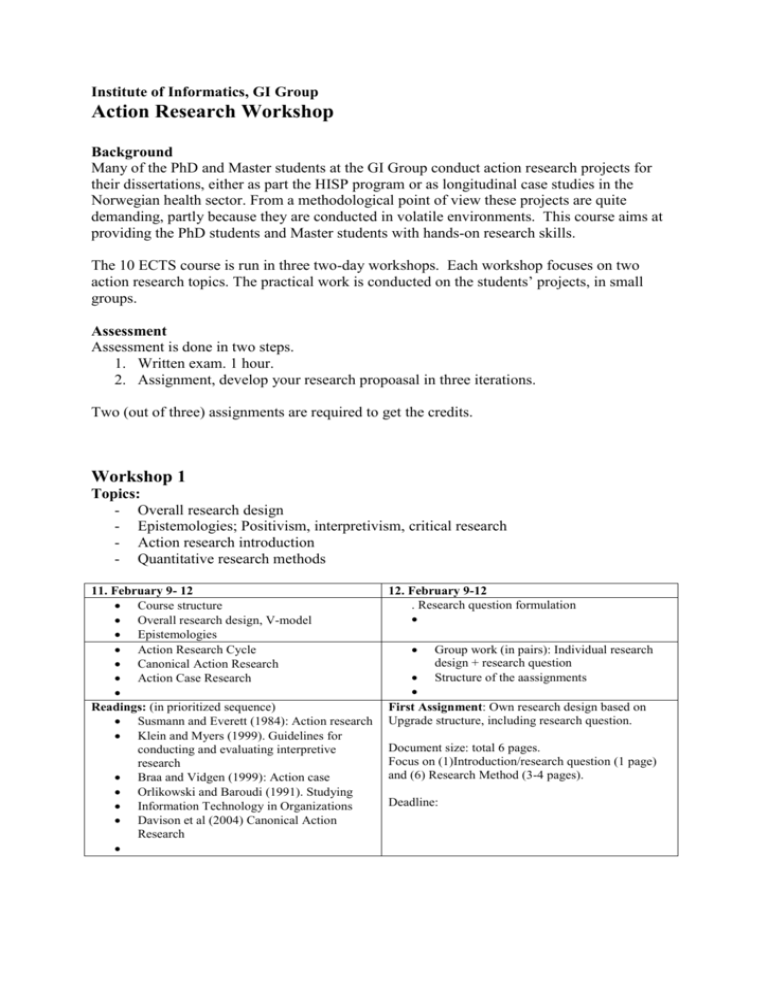
Institute of Informatics, GI Group Action Research Workshop Background Many of the PhD and Master students at the GI Group conduct action research projects for their dissertations, either as part the HISP program or as longitudinal case studies in the Norwegian health sector. From a methodological point of view these projects are quite demanding, partly because they are conducted in volatile environments. This course aims at providing the PhD students and Master students with hands-on research skills. The 10 ECTS course is run in three two-day workshops. Each workshop focuses on two action research topics. The practical work is conducted on the students’ projects, in small groups. Assessment Assessment is done in two steps. 1. Written exam. 1 hour. 2. Assignment, develop your research propoasal in three iterations. Two (out of three) assignments are required to get the credits. Workshop 1 Topics: - Overall research design - Epistemologies; Positivism, interpretivism, critical research - Action research introduction - Quantitative research methods 11. February 9- 12 Course structure Overall research design, V-model Epistemologies Action Research Cycle Canonical Action Research Action Case Research Readings: (in prioritized sequence) Susmann and Everett (1984): Action research Klein and Myers (1999). Guidelines for conducting and evaluating interpretive research Braa and Vidgen (1999): Action case Orlikowski and Baroudi (1991). Studying Information Technology in Organizations Davison et al (2004) Canonical Action Research 12. February 9-12 . Research question formulation Group work (in pairs): Individual research design + research question Structure of the aassignments First Assignment: Own research design based on Upgrade structure, including research question. Document size: total 6 pages. Focus on (1)Introduction/research question (1 page) and (6) Research Method (3-4 pages). Deadline: Workshop 2 Topics: - Action Design Research - Data Collection - Data Analysis - Qualitative research Interview 19 March 9 -12 Marit Anti Challenges with using quantitative methods and evaluate quantitative methods. The focusing is mainly on experiments, surveys and descriptive designs 20 March 9-12 Data collection Qualitative research Interview Readings: Sein et al (2011) Action Design Research Miles & Huberman (1994) Chapter 1-5 Kvale Brinkman: The Qualitative Research Interview Second Assignment: Revised research design and plans, Deadline: Workshop 3 Topics: - Evaluation of results - Theorizing 30th April. 09.15 to 12 Diagnosis Data Analysis . 13 - 16 Making contributions Readings: Miles & Huberman Chapter 10 Braa et al Network of Action Third Assignment: Research design Deadline: 24th of May Readings discussions: Walsham (2006) Walsham, G. (2006) "Doing interpretive research." European Journal of Information Systems, 15(3): 320-330 http://www.uio.no/studier/emner/matnat/ifi/INF3290/h12/undervisningsmateriale/artikler/walshamdoi ng-interpretiveresearchejis2006.pdf Sandberg and Alvesson Alvesson, M. & Sandberg, J., 2011. Generating Research Questions Through Problematization. Academy of Management Review, 36(2), pp.247271. Eisenhardt : Building Theories from Case Study Research Author(s): Kathleen M. Eisenhardt Source: The Academy of Management Review, Vol. 14, No. 4 (Oct., 1989), pp. 532-550Published Checkland and Holwell Title: Action Research: Its Nature and Validity Source: Systemic Practice and Action Research February 1998, Volume 11, Issue 1, pp 9-21 Walsham and Barrett Michael Barrett, Geoff Walsham (2004): "Making Contributions From Interpretive Case Studies: Examining Processes of Construction and Use". IFIP 8.2 workshop, 2004 http://link.springer.com/chapter/10.1007/1-4020-8095-6_17 Exam: in June (1 hour) 8th of June Literature Braa, K. and Vidgen, K. (1999) “Interpretation, intervention, and reduction in the organizational laboratory: a framework for in-context information system research”, Published in Bolan, Dick (ed.) Journal of Accounting, Management and Information Technologies, Elsevier Science Ltd. Vol. 9 pp 25-47Susmann and Everett: Action research. Braa, J., Monteiro, E., and Sanjay, S. (2007). "Networks of Action: Sustainable Health Information Systems Across Developing Countries." MIS Quarterly, 28(3). Checkland and Holwell (1998) "Action Research: Its Nature and Validity". Systemic Practice and Action Research, Vol. 11, No. 1, 1998 Davison, R. M., Martinsons, M. G., and Kock, N. (2004). " Principles of Canonical Action Research." Information Systems Journal, 14(1). Klein, H. K. and Michael D. Myers. "A Set of Principles for Conducting and Evaluating Interpretive Field Studies in Information Systems," MIS Quarterly, Special Issue on Intensive Research (23:1), 1999, pp. 67-93. Kvale, Steinar, Brinkman, Svend (2008): Learning the craft of qualitative research interviewing, Sage Michael Barrett, Geoff Walsham (2004): "Making Contributions From Interpretive Case Studies: Examining Processes of Construction and Use". IFIP 8.2 workshop, 2004 Miles, M. B., and Huberman, A. M. (1994). Qualitative Data Analysis, Thousand Oaks: Sage Publications. Orlikowski, W.J. & Baroudi, J.J. (1991). "Studying Information Technology in Organizations: Research Approaches and Assumptions", Information Systems Research (2) 1991, pp. 1-28. Sein, M., Henfridsson, O., Purao, S., Rossi, M., and Lindgren, R. (2011). "Action Design Research." MIS Quarterly, 35(2). Susman and Evered (1978). “An Assessment of the Scientific Merits of Action Research.” Administrative Science Quarterly (1978), 582-603.
